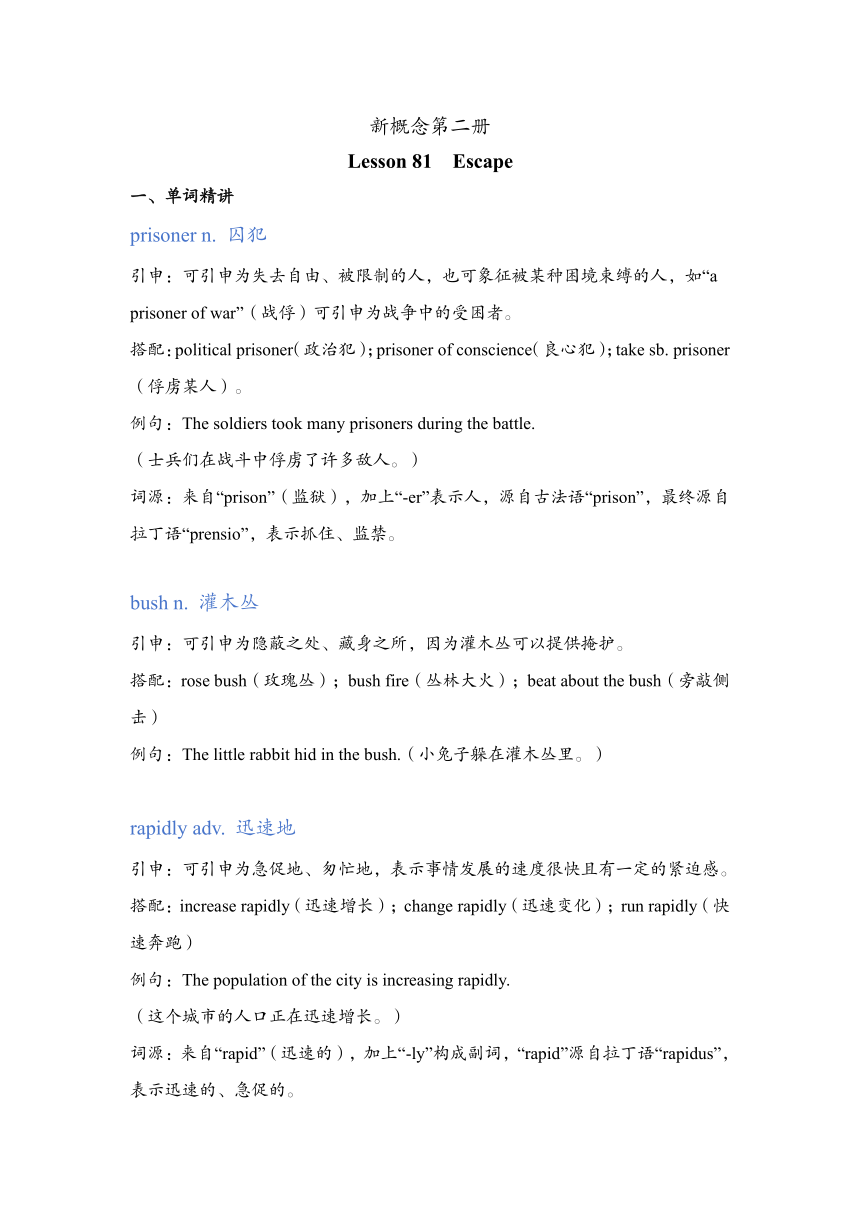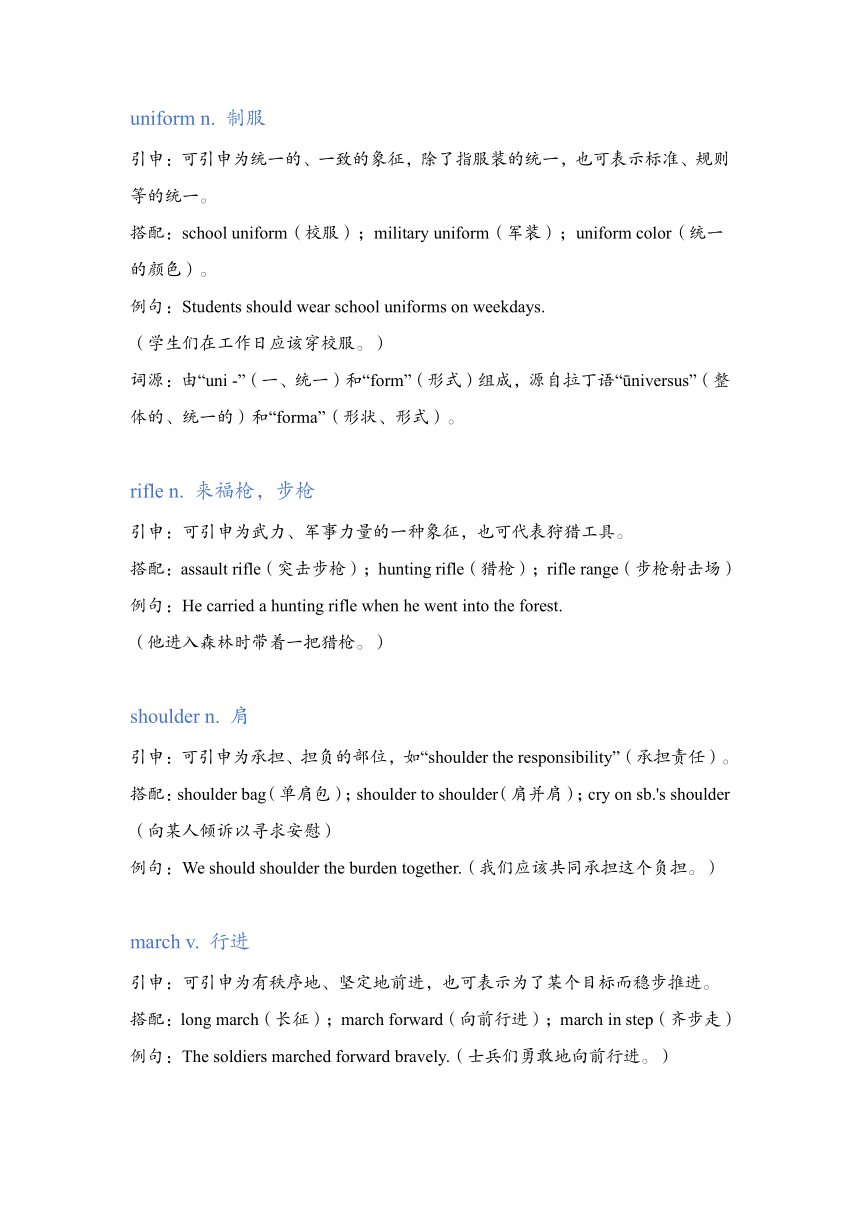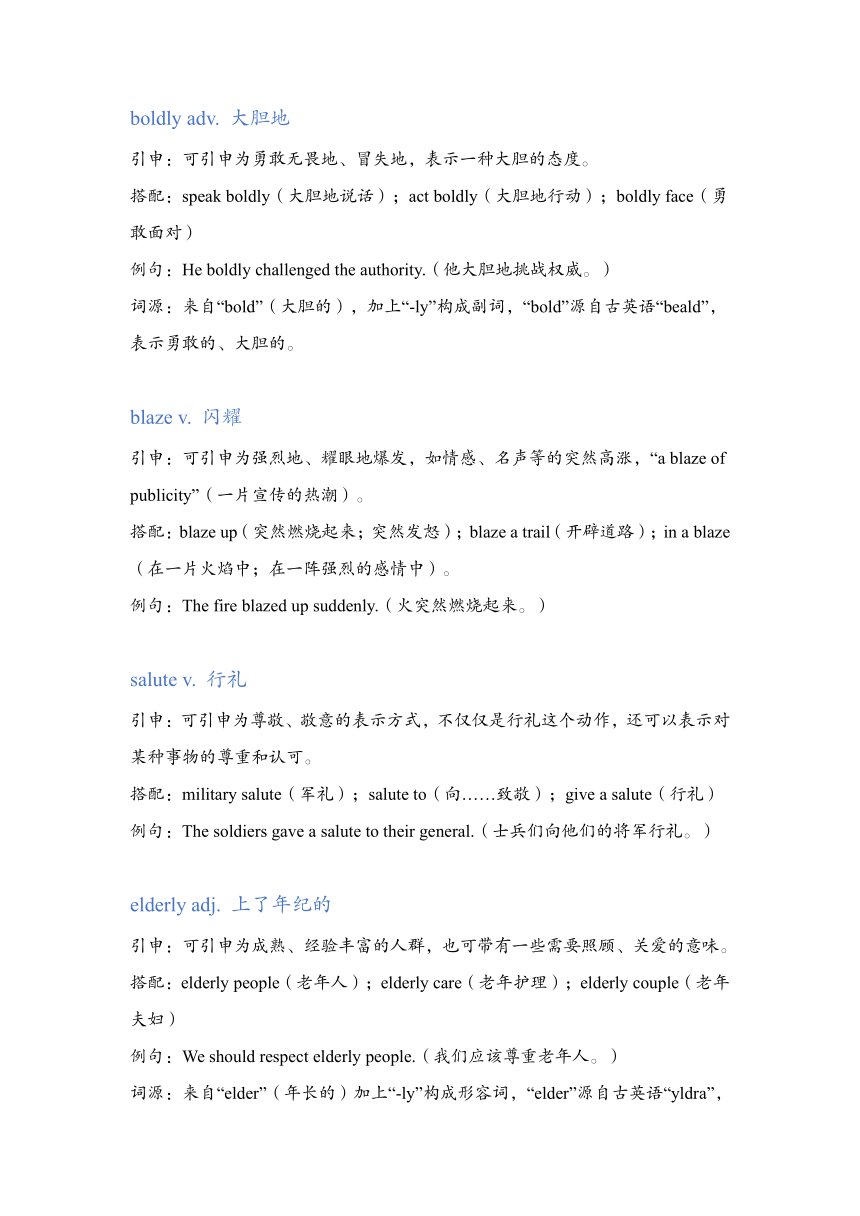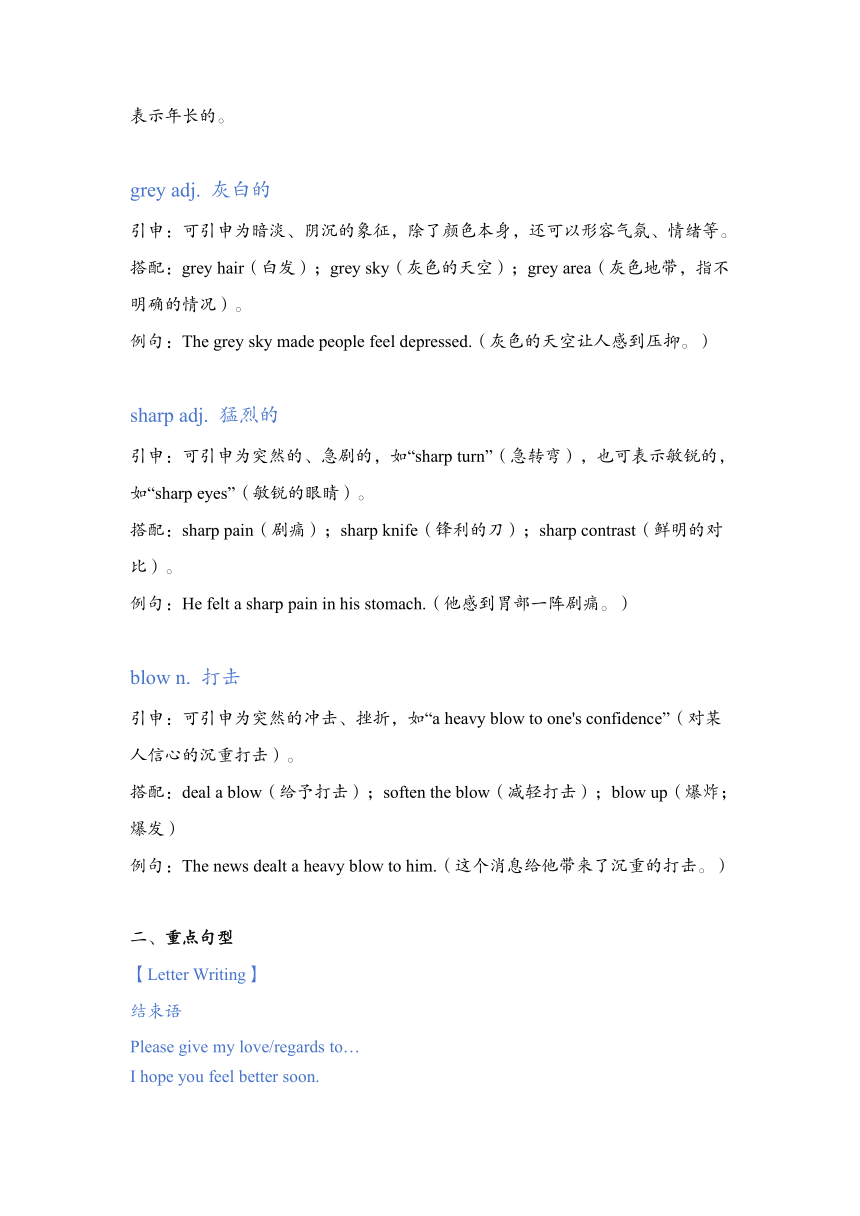新概念第二册Lesson 81 Escape讲义
文档属性
| 名称 | 新概念第二册Lesson 81 Escape讲义 |  | |
| 格式 | docx | ||
| 文件大小 | 148.3KB | ||
| 资源类型 | 教案 | ||
| 版本资源 | 新概念英语 | ||
| 科目 | 英语 | ||
| 更新时间 | 2024-11-25 15:10:43 | ||
图片预览




文档简介
新概念第二册
Lesson 81 Escape
单词精讲
prisoner n. 囚犯
引申:可引申为失去自由、被限制的人,也可象征被某种困境束缚的人,如“a prisoner of war”(战俘)可引申为战争中的受困者。
搭配:political prisoner(政治犯);prisoner of conscience(良心犯);take sb. prisoner(俘虏某人)。
例句:The soldiers took many prisoners during the battle.
(士兵们在战斗中俘虏了许多敌人。)
词源:来自“prison”(监狱),加上“-er”表示人,源自古法语“prison”,最终源自拉丁语“prensio”,表示抓住、监禁。
bush n. 灌木丛
引申:可引申为隐蔽之处、藏身之所,因为灌木丛可以提供掩护。
搭配:rose bush(玫瑰丛);bush fire(丛林大火);beat about the bush(旁敲侧击)
例句:The little rabbit hid in the bush.(小兔子躲在灌木丛里。)
rapidly adv. 迅速地
引申:可引申为急促地、匆忙地,表示事情发展的速度很快且有一定的紧迫感。
搭配:increase rapidly(迅速增长);change rapidly(迅速变化);run rapidly(快速奔跑)
例句:The population of the city is increasing rapidly.
(这个城市的人口正在迅速增长。)
词源:来自“rapid”(迅速的),加上“-ly”构成副词,“rapid”源自拉丁语“rapidus”,表示迅速的、急促的。
uniform n. 制服
引申:可引申为统一的、一致的象征,除了指服装的统一,也可表示标准、规则等的统一。
搭配:school uniform(校服);military uniform(军装);uniform color(统一的颜色)。
例句:Students should wear school uniforms on weekdays.
(学生们在工作日应该穿校服。)
词源:由“uni -”(一、统一)和“form”(形式)组成,源自拉丁语“ūniversus”(整体的、统一的)和“forma”(形状、形式)。
rifle n. 来福枪,步枪
引申:可引申为武力、军事力量的一种象征,也可代表狩猎工具。
搭配:assault rifle(突击步枪);hunting rifle(猎枪);rifle range(步枪射击场)
例句:He carried a hunting rifle when he went into the forest.
(他进入森林时带着一把猎枪。)
shoulder n. 肩
引申:可引申为承担、担负的部位,如“shoulder the responsibility”(承担责任)。
搭配:shoulder bag(单肩包);shoulder to shoulder(肩并肩);cry on sb.'s shoulder(向某人倾诉以寻求安慰)
例句:We should shoulder the burden together.(我们应该共同承担这个负担。)
march v. 行进
引申:可引申为有秩序地、坚定地前进,也可表示为了某个目标而稳步推进。
搭配:long march(长征);march forward(向前行进);march in step(齐步走)
例句:The soldiers marched forward bravely.(士兵们勇敢地向前行进。)
boldly adv. 大胆地
引申:可引申为勇敢无畏地、冒失地,表示一种大胆的态度。
搭配:speak boldly(大胆地说话);act boldly(大胆地行动);boldly face(勇敢面对)
例句:He boldly challenged the authority.(他大胆地挑战权威。)
词源:来自“bold”(大胆的),加上“-ly”构成副词,“bold”源自古英语“beald”,表示勇敢的、大胆的。
blaze v. 闪耀
引申:可引申为强烈地、耀眼地爆发,如情感、名声等的突然高涨,“a blaze of publicity”(一片宣传的热潮)。
搭配:blaze up(突然燃烧起来;突然发怒);blaze a trail(开辟道路);in a blaze(在一片火焰中;在一阵强烈的感情中)。
例句:The fire blazed up suddenly.(火突然燃烧起来。)
salute v. 行礼
引申:可引申为尊敬、敬意的表示方式,不仅仅是行礼这个动作,还可以表示对某种事物的尊重和认可。
搭配:military salute(军礼);salute to(向……致敬);give a salute(行礼)
例句:The soldiers gave a salute to their general.(士兵们向他们的将军行礼。)
elderly adj. 上了年纪的
引申:可引申为成熟、经验丰富的人群,也可带有一些需要照顾、关爱的意味。
搭配:elderly people(老年人);elderly care(老年护理);elderly couple(老年夫妇)
例句:We should respect elderly people.(我们应该尊重老年人。)
词源:来自“elder”(年长的)加上“-ly”构成形容词,“elder”源自古英语“yldra”,表示年长的。
grey adj. 灰白的
引申:可引申为暗淡、阴沉的象征,除了颜色本身,还可以形容气氛、情绪等。
搭配:grey hair(白发);grey sky(灰色的天空);grey area(灰色地带,指不明确的情况)。
例句:The grey sky made people feel depressed.(灰色的天空让人感到压抑。)
sharp adj. 猛烈的
引申:可引申为突然的、急剧的,如“sharp turn”(急转弯),也可表示敏锐的,如“sharp eyes”(敏锐的眼睛)。
搭配:sharp pain(剧痛);sharp knife(锋利的刀);sharp contrast(鲜明的对比)。
例句:He felt a sharp pain in his stomach.(他感到胃部一阵剧痛。)
blow n. 打击
引申:可引申为突然的冲击、挫折,如“a heavy blow to one's confidence”(对某人信心的沉重打击)。
搭配:deal a blow(给予打击);soften the blow(减轻打击);blow up(爆炸;爆发)
例句:The news dealt a heavy blow to him.(这个消息给他带来了沉重的打击。)
重点句型
【Letter Writing】
结束语
Please give my love/regards to…
I hope you feel better soon.
【Special Difficulties】
Cloth,Clothes and Clothing
cloth
① n. 布,布料(不可数名词)
There’s enough cloth for a skirt.
Do you think the cloth will wear well 你认为这布料会耐穿吗?
② n. 抹布,桌布(可数名词)
Wipe up the mess with a cloth.
clothes n. 衣服,服装(后面动词用复数形式)
My clothes are mostly bought from abroad.
clothing n. 服装的总称(不可数名词,包括衣服、鞋、帽等)
He still needs some winter clothing.
Salute and Greet
salute v. 行军礼,(向……)敬礼
The guard saluted as the officers passed.
The guard saluted the officers.
greet v. 打招呼,欢迎,迎接
When we arrived, the whole family stood up to greet us.
He greeted Dan with a nod.
Clear and Clean
clear
① adj. 清澈的,明亮的,晴朗的
He was rather elderly with clear blue eyes.
Seeing that it was a clear day, he drove to the countryside.
② adj. 清楚的,明确的,明了的
I want to make it clear that I’m not paying the bill.
③ adj. 畅通的,无障碍的,无危险的
You can drive fast only when you are on a clear road.
clean
① adj. 干净的
These cups are not very clean.
② adj. 无污点的,无犯罪历史的
He has a clean record. 他一贯表现很好(没有前科)。
课文精讲
When he had killed the guard, the prisoner of war quickly dragged him into the bushes. 那个战俘杀死卫兵以后,迅速地把尸体拖进了灌木丛。
这个句子里he和the prisoner是同一个人,在叙述时为了避免重复,就将其中一个用代词表示。
drag、draw和pull都有拖、拽的意思,它们的区别如下:
drag: 指沿斜坡而上或水平方向缓慢地拖或拉十分沉重的人或物。作借喻时可指把人硬拉过来.
draw: 指将人或物朝出力者的方向拖,不涉及力的大小,含平稳意味,常作借喻用。
pull: 最普通用词,包含本组其它各词的一些意思,可指朝各个方向拉,侧重一时或突然拉动的动作。
Working rapidly in the darkness, he soon changed into the dead man's clothes.
他在黑暗中忙活了一阵儿,很快就换上了死者的衣服。
“Working rapidly in the darkness”是现在分词短语作状语,表示伴随状况,其中“Working”是现在分词,“rapidly”是副词修饰“Working”,“in the darkness”是介词短语作状语。“he soon changed into the dead man's clothes”是主句,“he”是主语,“soon”是副词作状语,“changed into”是固定短语,意为“换上、变成”,“the dead man's clothes”是宾语。
“change into”表示改变成为、换上(衣服等),例如:She changed into her evening dress.(她换上了晚礼服。)
Now, dressed in a blue uniform and with a rifle over his shoulder, the prisoner marched boldly up and down in front of the camp.
现在他身穿蓝军装,肩扛步枪,在军营门前大胆地来回走看。
现在他身穿蓝军装,肩扛步枪,在军营门前大胆地来回走看。
①dress in+sth 穿上某物;乔装打扮
She dressed in blue evening dress to attend the banquet.
她穿着蓝色晚礼服去参加晚宴。
②march up and down 来回踱步,走来走去
He could hear shouting in the camp itself.他听得军营里面的喧闹声。
①hear同see、watch、feel、notice等感观动词一样,其宾语后所接的不定式不含to。例如:I often hear her sing.我常听到她唱歌。
但当hear用于被动语态时,不定式中要含to。
She is often heard to sing.人们经常听到她唱歌。
②hear的宾语后既可接不定式,也可接动名词。但是在表示“故意听……”时,只能用不定式。
I often hear her sing.
I often hear her singing.
hear from sb. 接到……的信 hear about / of 听说
At that moment, a large black car with four officers inside it, stopped at the camp gates.
里面坐了4个军官。军官们下了车,战俘立正站好,并在他们从他面前经过时敬了礼。
这是一个简单句。“At that moment”是时间状语。“a large black car with four officers inside it”是句子的主语,其中“a large black car”是中心词,“with four officers inside it”是“with + 宾语+ 宾语补足语”结构作后置定语,修饰“car”。“stopped”是谓语动词,“at the camp gates”是介词短语作地点状语。
“at the camp gates”表示在营地的大门处。
The officers got out and the prisoner stood to attention and saluted as they passed.军官们下了车,战俘立正站好,并在他们从他面前经过时敬了礼。
① stand to attention 立正,当在军事训练中喊到“立正”这一口号时可直接用“Attention”表示。
② salute 及物动词 表示“行礼、致意、问候”。
We salute the flag every Monday at school.我们在学校每周一向国旗行礼。
③ pass 经过;传递;通过
We passed slowly down the hill in the afternoon.下午时我们慢慢向山下移动。
pass by 经过 pass over 忽视,放过 pass on 传递,传授
pass out 昏倒,失去知觉 pass for 被当作
When they had gone, the driver of the car came towards him. The man obviously wanted to talk. He was rather elderly with grey hair and clear blue eyes.
他们走后,汽车司机向他走来,这人显然是想聊天。
第一个句子“When they had gone, the driver of the car came towards him”是复合句,“When they had gone”是时间状语从句,“they”是从句的主语,“had gone”是过去完成时,表示在主句动作之前已经完成的动作,“the driver of the car came towards him”是主句,“the driver of the car”是主语,“came towards”是谓语,表示“向……走来”的动作,“him”是宾语。“The man obviously wanted to talk”是一个简单句,“The man”是主语,“obviously”是副词作状语,“wanted”是谓语动词,“to talk”是不定式作宾语。“He was rather elderly with grey hair and clear blue eyes”是一个简单句,“He”是主语,“was”是系动词,“rather elderly”是表语,“with grey hair and clear blue eyes”是“with + 宾语+ 宾语补足语”结构作伴随状语。
The prisoner felt sorry for him, but there was nothing else he could do.
战俘为他感到惋惜,但却没有别的选择。
这是一个由并列句组成的句子。“The prisoner felt sorry for him”是一个简单句,“The prisoner”是主语,“felt”是系动词,“sorry”是表语,“for him”是介词短语作状语。“but there was nothing else he could do”是另一个句子,“there was”是“there be”句型,“nothing else”是主语,“he could do”是定语从句,修饰“nothing else”。
“feel sorry for”是固定短语,意为“为……感到难过、同情”,例如:I feel sorry for the poor dog.(我为这只可怜的狗感到难过。)
As the man came near, the prisoner knocked him to the ground with a sharp blow.当这个人走近时,战俘一拳把他打倒在地。
① come near 走近,接近;几乎
② knock to the ground 打倒在地
③ 这个句子是由as引导的时间状语从句。
我们目前接触得比较多的时间状语从句多由when、while、as引导。
A. when引导 a. 表示“当……的时候” 可与延续性动词或非延续性动词连用。例如:When I get the result, I will tell you right away.当我知道结果后我就立马告诉你。
b. 表示“正当……的时候” 相当于be about to do sth. when
I was watching a movie when he called me.他给我打电话时我正在看电影。
B. while引导 a. 表示“当……的时候” 与延续性动词连用,主要强调的是主语的谓语动词表示的动作发生在从句谓语动词表示的动作期间,即在一个过程中插入某动作。
While I was in my postgraduate study, I enjoyed reading in the library.
在我研究生学习阶段,我特别喜欢去图书馆看书。
b. 表示“然而”,做并列连词,表示转折。
While my wife was reading the newspaper, I was watching TV.
当妻子正在看报纸的时候,我正在看电视。
C. as引导 a. 表示“一边……一边……”
The students danced as they sang.
学生们一边唱歌一边跳舞。
b. 表示“随着”
As the time goes on, her sorrow gradually fades.
随着时间的流逝,她的悲伤渐渐消散。
Lesson 81 Escape
单词精讲
prisoner n. 囚犯
引申:可引申为失去自由、被限制的人,也可象征被某种困境束缚的人,如“a prisoner of war”(战俘)可引申为战争中的受困者。
搭配:political prisoner(政治犯);prisoner of conscience(良心犯);take sb. prisoner(俘虏某人)。
例句:The soldiers took many prisoners during the battle.
(士兵们在战斗中俘虏了许多敌人。)
词源:来自“prison”(监狱),加上“-er”表示人,源自古法语“prison”,最终源自拉丁语“prensio”,表示抓住、监禁。
bush n. 灌木丛
引申:可引申为隐蔽之处、藏身之所,因为灌木丛可以提供掩护。
搭配:rose bush(玫瑰丛);bush fire(丛林大火);beat about the bush(旁敲侧击)
例句:The little rabbit hid in the bush.(小兔子躲在灌木丛里。)
rapidly adv. 迅速地
引申:可引申为急促地、匆忙地,表示事情发展的速度很快且有一定的紧迫感。
搭配:increase rapidly(迅速增长);change rapidly(迅速变化);run rapidly(快速奔跑)
例句:The population of the city is increasing rapidly.
(这个城市的人口正在迅速增长。)
词源:来自“rapid”(迅速的),加上“-ly”构成副词,“rapid”源自拉丁语“rapidus”,表示迅速的、急促的。
uniform n. 制服
引申:可引申为统一的、一致的象征,除了指服装的统一,也可表示标准、规则等的统一。
搭配:school uniform(校服);military uniform(军装);uniform color(统一的颜色)。
例句:Students should wear school uniforms on weekdays.
(学生们在工作日应该穿校服。)
词源:由“uni -”(一、统一)和“form”(形式)组成,源自拉丁语“ūniversus”(整体的、统一的)和“forma”(形状、形式)。
rifle n. 来福枪,步枪
引申:可引申为武力、军事力量的一种象征,也可代表狩猎工具。
搭配:assault rifle(突击步枪);hunting rifle(猎枪);rifle range(步枪射击场)
例句:He carried a hunting rifle when he went into the forest.
(他进入森林时带着一把猎枪。)
shoulder n. 肩
引申:可引申为承担、担负的部位,如“shoulder the responsibility”(承担责任)。
搭配:shoulder bag(单肩包);shoulder to shoulder(肩并肩);cry on sb.'s shoulder(向某人倾诉以寻求安慰)
例句:We should shoulder the burden together.(我们应该共同承担这个负担。)
march v. 行进
引申:可引申为有秩序地、坚定地前进,也可表示为了某个目标而稳步推进。
搭配:long march(长征);march forward(向前行进);march in step(齐步走)
例句:The soldiers marched forward bravely.(士兵们勇敢地向前行进。)
boldly adv. 大胆地
引申:可引申为勇敢无畏地、冒失地,表示一种大胆的态度。
搭配:speak boldly(大胆地说话);act boldly(大胆地行动);boldly face(勇敢面对)
例句:He boldly challenged the authority.(他大胆地挑战权威。)
词源:来自“bold”(大胆的),加上“-ly”构成副词,“bold”源自古英语“beald”,表示勇敢的、大胆的。
blaze v. 闪耀
引申:可引申为强烈地、耀眼地爆发,如情感、名声等的突然高涨,“a blaze of publicity”(一片宣传的热潮)。
搭配:blaze up(突然燃烧起来;突然发怒);blaze a trail(开辟道路);in a blaze(在一片火焰中;在一阵强烈的感情中)。
例句:The fire blazed up suddenly.(火突然燃烧起来。)
salute v. 行礼
引申:可引申为尊敬、敬意的表示方式,不仅仅是行礼这个动作,还可以表示对某种事物的尊重和认可。
搭配:military salute(军礼);salute to(向……致敬);give a salute(行礼)
例句:The soldiers gave a salute to their general.(士兵们向他们的将军行礼。)
elderly adj. 上了年纪的
引申:可引申为成熟、经验丰富的人群,也可带有一些需要照顾、关爱的意味。
搭配:elderly people(老年人);elderly care(老年护理);elderly couple(老年夫妇)
例句:We should respect elderly people.(我们应该尊重老年人。)
词源:来自“elder”(年长的)加上“-ly”构成形容词,“elder”源自古英语“yldra”,表示年长的。
grey adj. 灰白的
引申:可引申为暗淡、阴沉的象征,除了颜色本身,还可以形容气氛、情绪等。
搭配:grey hair(白发);grey sky(灰色的天空);grey area(灰色地带,指不明确的情况)。
例句:The grey sky made people feel depressed.(灰色的天空让人感到压抑。)
sharp adj. 猛烈的
引申:可引申为突然的、急剧的,如“sharp turn”(急转弯),也可表示敏锐的,如“sharp eyes”(敏锐的眼睛)。
搭配:sharp pain(剧痛);sharp knife(锋利的刀);sharp contrast(鲜明的对比)。
例句:He felt a sharp pain in his stomach.(他感到胃部一阵剧痛。)
blow n. 打击
引申:可引申为突然的冲击、挫折,如“a heavy blow to one's confidence”(对某人信心的沉重打击)。
搭配:deal a blow(给予打击);soften the blow(减轻打击);blow up(爆炸;爆发)
例句:The news dealt a heavy blow to him.(这个消息给他带来了沉重的打击。)
重点句型
【Letter Writing】
结束语
Please give my love/regards to…
I hope you feel better soon.
【Special Difficulties】
Cloth,Clothes and Clothing
cloth
① n. 布,布料(不可数名词)
There’s enough cloth for a skirt.
Do you think the cloth will wear well 你认为这布料会耐穿吗?
② n. 抹布,桌布(可数名词)
Wipe up the mess with a cloth.
clothes n. 衣服,服装(后面动词用复数形式)
My clothes are mostly bought from abroad.
clothing n. 服装的总称(不可数名词,包括衣服、鞋、帽等)
He still needs some winter clothing.
Salute and Greet
salute v. 行军礼,(向……)敬礼
The guard saluted as the officers passed.
The guard saluted the officers.
greet v. 打招呼,欢迎,迎接
When we arrived, the whole family stood up to greet us.
He greeted Dan with a nod.
Clear and Clean
clear
① adj. 清澈的,明亮的,晴朗的
He was rather elderly with clear blue eyes.
Seeing that it was a clear day, he drove to the countryside.
② adj. 清楚的,明确的,明了的
I want to make it clear that I’m not paying the bill.
③ adj. 畅通的,无障碍的,无危险的
You can drive fast only when you are on a clear road.
clean
① adj. 干净的
These cups are not very clean.
② adj. 无污点的,无犯罪历史的
He has a clean record. 他一贯表现很好(没有前科)。
课文精讲
When he had killed the guard, the prisoner of war quickly dragged him into the bushes. 那个战俘杀死卫兵以后,迅速地把尸体拖进了灌木丛。
这个句子里he和the prisoner是同一个人,在叙述时为了避免重复,就将其中一个用代词表示。
drag、draw和pull都有拖、拽的意思,它们的区别如下:
drag: 指沿斜坡而上或水平方向缓慢地拖或拉十分沉重的人或物。作借喻时可指把人硬拉过来.
draw: 指将人或物朝出力者的方向拖,不涉及力的大小,含平稳意味,常作借喻用。
pull: 最普通用词,包含本组其它各词的一些意思,可指朝各个方向拉,侧重一时或突然拉动的动作。
Working rapidly in the darkness, he soon changed into the dead man's clothes.
他在黑暗中忙活了一阵儿,很快就换上了死者的衣服。
“Working rapidly in the darkness”是现在分词短语作状语,表示伴随状况,其中“Working”是现在分词,“rapidly”是副词修饰“Working”,“in the darkness”是介词短语作状语。“he soon changed into the dead man's clothes”是主句,“he”是主语,“soon”是副词作状语,“changed into”是固定短语,意为“换上、变成”,“the dead man's clothes”是宾语。
“change into”表示改变成为、换上(衣服等),例如:She changed into her evening dress.(她换上了晚礼服。)
Now, dressed in a blue uniform and with a rifle over his shoulder, the prisoner marched boldly up and down in front of the camp.
现在他身穿蓝军装,肩扛步枪,在军营门前大胆地来回走看。
现在他身穿蓝军装,肩扛步枪,在军营门前大胆地来回走看。
①dress in+sth 穿上某物;乔装打扮
She dressed in blue evening dress to attend the banquet.
她穿着蓝色晚礼服去参加晚宴。
②march up and down 来回踱步,走来走去
He could hear shouting in the camp itself.他听得军营里面的喧闹声。
①hear同see、watch、feel、notice等感观动词一样,其宾语后所接的不定式不含to。例如:I often hear her sing.我常听到她唱歌。
但当hear用于被动语态时,不定式中要含to。
She is often heard to sing.人们经常听到她唱歌。
②hear的宾语后既可接不定式,也可接动名词。但是在表示“故意听……”时,只能用不定式。
I often hear her sing.
I often hear her singing.
hear from sb. 接到……的信 hear about / of 听说
At that moment, a large black car with four officers inside it, stopped at the camp gates.
里面坐了4个军官。军官们下了车,战俘立正站好,并在他们从他面前经过时敬了礼。
这是一个简单句。“At that moment”是时间状语。“a large black car with four officers inside it”是句子的主语,其中“a large black car”是中心词,“with four officers inside it”是“with + 宾语+ 宾语补足语”结构作后置定语,修饰“car”。“stopped”是谓语动词,“at the camp gates”是介词短语作地点状语。
“at the camp gates”表示在营地的大门处。
The officers got out and the prisoner stood to attention and saluted as they passed.军官们下了车,战俘立正站好,并在他们从他面前经过时敬了礼。
① stand to attention 立正,当在军事训练中喊到“立正”这一口号时可直接用“Attention”表示。
② salute 及物动词 表示“行礼、致意、问候”。
We salute the flag every Monday at school.我们在学校每周一向国旗行礼。
③ pass 经过;传递;通过
We passed slowly down the hill in the afternoon.下午时我们慢慢向山下移动。
pass by 经过 pass over 忽视,放过 pass on 传递,传授
pass out 昏倒,失去知觉 pass for 被当作
When they had gone, the driver of the car came towards him. The man obviously wanted to talk. He was rather elderly with grey hair and clear blue eyes.
他们走后,汽车司机向他走来,这人显然是想聊天。
第一个句子“When they had gone, the driver of the car came towards him”是复合句,“When they had gone”是时间状语从句,“they”是从句的主语,“had gone”是过去完成时,表示在主句动作之前已经完成的动作,“the driver of the car came towards him”是主句,“the driver of the car”是主语,“came towards”是谓语,表示“向……走来”的动作,“him”是宾语。“The man obviously wanted to talk”是一个简单句,“The man”是主语,“obviously”是副词作状语,“wanted”是谓语动词,“to talk”是不定式作宾语。“He was rather elderly with grey hair and clear blue eyes”是一个简单句,“He”是主语,“was”是系动词,“rather elderly”是表语,“with grey hair and clear blue eyes”是“with + 宾语+ 宾语补足语”结构作伴随状语。
The prisoner felt sorry for him, but there was nothing else he could do.
战俘为他感到惋惜,但却没有别的选择。
这是一个由并列句组成的句子。“The prisoner felt sorry for him”是一个简单句,“The prisoner”是主语,“felt”是系动词,“sorry”是表语,“for him”是介词短语作状语。“but there was nothing else he could do”是另一个句子,“there was”是“there be”句型,“nothing else”是主语,“he could do”是定语从句,修饰“nothing else”。
“feel sorry for”是固定短语,意为“为……感到难过、同情”,例如:I feel sorry for the poor dog.(我为这只可怜的狗感到难过。)
As the man came near, the prisoner knocked him to the ground with a sharp blow.当这个人走近时,战俘一拳把他打倒在地。
① come near 走近,接近;几乎
② knock to the ground 打倒在地
③ 这个句子是由as引导的时间状语从句。
我们目前接触得比较多的时间状语从句多由when、while、as引导。
A. when引导 a. 表示“当……的时候” 可与延续性动词或非延续性动词连用。例如:When I get the result, I will tell you right away.当我知道结果后我就立马告诉你。
b. 表示“正当……的时候” 相当于be about to do sth. when
I was watching a movie when he called me.他给我打电话时我正在看电影。
B. while引导 a. 表示“当……的时候” 与延续性动词连用,主要强调的是主语的谓语动词表示的动作发生在从句谓语动词表示的动作期间,即在一个过程中插入某动作。
While I was in my postgraduate study, I enjoyed reading in the library.
在我研究生学习阶段,我特别喜欢去图书馆看书。
b. 表示“然而”,做并列连词,表示转折。
While my wife was reading the newspaper, I was watching TV.
当妻子正在看报纸的时候,我正在看电视。
C. as引导 a. 表示“一边……一边……”
The students danced as they sang.
学生们一边唱歌一边跳舞。
b. 表示“随着”
As the time goes on, her sorrow gradually fades.
随着时间的流逝,她的悲伤渐渐消散。
同课章节目录
